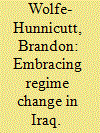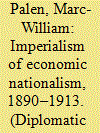|
|
|
Sort Order |
|
|
|
Items / Page
|
|
|
|
|
|
|
| Srl | Item |
| 1 |
ID:
138311


|
|
|
|
|
| Summary/Abstract |
This article examines collaborations between Marshall Planners and American department stores during the early years of the Cold War to persuade American consumers, especially women, to buy European imports. Specifically, it analyzes four elaborate imports fairs held in 1950 and 1951 by Gimbel’s in Philadelphia, Macy’s in New York City, and Jordan Marsh in Boston. The purpose of the promotions was twofold. First, Marshall Planners hoped that American consumers would help alleviate Europe’s “dollar gap” to provide it with the dollars needed to buy essential American raw materials and manufactured goods. Second, the exhibits served a public relations goal, as Marshall Planners tried to sell Americans on the tangible benefits of the European Recovery Program to their everyday lives. By “buying European,” Marshall Planners hoped that Americans would not only assist in European economic recovery, but would also realize the value of liberal internationalism to the postwar world.
|
|
|
|
|
|
|
|
|
|
|
|
|
|
|
|
| 2 |
ID:
138312


|
|
|
|
|
| Summary/Abstract |
The myth that U.S. expansionism drove the War of 1812 has proven resilient. Histories attributing the war to a U.S. desire to absorb Canada continue to be published despite relative consensus among experts that the primary U.S. objective was the repeal of British maritime restrictions, and even experts often include caveats regarding possible expansionism underlying U.S. motives. This article finally lays this myth to rest. The Madison administration and Congress initiated the War of 1812 because six years of economic sanctions had failed to bring Britain to the negotiating table, and threatening the Royal Navy’s Canadian supply base was their last hope. Expansionism would have made sense given the precedent of the Revolution, British military preoccupation with Napoleon, and the material gains to be had by annexing Canada, but U.S. leaders feared the domestic political consequences of doing so. Notably, what limited expansionism there was focused on sparsely populated western lands rather than the more populous eastern settlements.
|
|
|
|
|
|
|
|
|
|
|
|
|
|
|
|
| 3 |
ID:
138313


|
|
|
|
|
| Summary/Abstract |
This article analyzes the U.S. foreign policy response to the 1958 Free Officers’ Revolution in Iraq. I look specifically at the question of the U.S. involvement in the 1963 coup d'état that first brought the Ba‘th party to power. Given the limits of available documentation, I leave the question of CIA involvement to one side and focus on the underlying logic of the U.S. foreign policy toward Iraq between 1958 and 1963. I show that while the American policymakers were deeply divided between a hard-line interventionist faction and a more accommodating anti-interventionist faction, by the middle of 1962, the Kennedy administration embraced regime change as the U.S. policy objective in Iraq. I further argue that it was the perceived threat to Iraqi oil installations, and not the fear of a Communist takeover, that pushed the American policy to embrace a policy of regime change.
|
|
|
|
|
|
|
|
|
|
|
|
|
|
|
|
| 4 |
ID:
138315


|
|
|
|
|
| Summary/Abstract |
Debunking the common laissez-faire myth surrounding turn-of-the-century American foreign relations allows for a reconceptualization of American imperialism from 1890 to 1913. The Republican Party, the party of protectionism, found itself riven by internal disagreements over the future of the protectionist system and U.S. imperial expansion. From within Republican protectionist ranks arose a progressive wing that increasingly looked beyond the home market for the country’s growing American agricultural and manufacturing surpluses. They did so against staunch anti-imperial opposition not only from American free-trade independents, but also from the Republican Party’s isolationist home-market protectionists, who yet feared or disdained foreign markets and colonial acquisitions. These progressive Republican proponents of empire combined coercive trade reciprocity with protectionism—an expansive closed door—and worked hard to extend American imperial power through informal means of high tariff walls, closed U.S.-controlled markets, and retaliatory reciprocity if possible, by formal annexation and military interventionism when necessary. The American Empire thus arose owing to the imperialism of economic nationalism, not the imperialism of free trade.
|
|
|
|
|
|
|
|
|
|
|
|
|
|
|
|
| 5 |
ID:
138310


|
|
|
|
|
| Summary/Abstract |
This article examines the burst of airline hijacking that occurred from the U.S. to Cuba between 1968 and 1973. Attracted by Cuba s revolutionary mystique and seeking political asylum, sanctuary from racism, participation in Third World liberation movements, haven from criminal charges, and apolitical adventure, Americans hijacked more planes to Cuba during this period than all other global hijacking incidents combined. Constructing Cuba as an idealized imagined nation as an alternative to capitalism, white domination, and U.S. global hegemony and as a portal to Third World movements within the geopolitical context of the Cold War and decolonization, hijackers formulated themselves as beleaguered idealists and political refugees. Influencing U.S.-Cuba relations and resulting in an unprecedented diplomatic collaboration between the two nations to produce a mutual anti-hijacking agreement, the hijacking epidemic of 1968- 73 marks the unlikely meeting point where political protest movements, the African American freedom struggle, and U.S.-Cuba relations collided in the late 1960s.
|
|
|
|
|
|
|
|
|
|
|
|
|
|
|
|
| 6 |
ID:
138314


|
|
|
|
|
| Summary/Abstract |
Focusing on the abortive Second Afro-Asian Conference of 1965, this article analyzes American efforts to shape the future of Third World internationalism during a critical period of transition in the history of the Third World project, of U.S. relations with the Third World, and of the global Cold War.
|
|
|
|
|
|
|
|
|
|
|
|
|
|
|
|
|
|
|
|
|